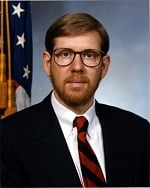Johnson & Johnson ($JNJ) some time back agreed to pay $2.2 billion to settle federal claims that it improperly marketed the antipsychotic drug Risperdal. But the drugmaker's legal hassles over the drug are not all done. Last week opening arguments were made in a case in which the drugmaker is accused of marketing the drug for use in young boys and then not sufficiently warning patients that the side effects for some included the possibility they would grow breasts.
 |
| Former FDA Commissioner David Kessler |
The case in the Philadelphia Court of Common Pleas revolves around a young man, now 20, that suffered that side effect, a condition his lawyers said in opening statements can only be dealt with through a mastectomy. According to a description of the opening arguments from Sheller, the law firm that brought the case, they contend their client was prescribed Risperdal "off label" at age 8. Former FDA Commissioner David Kessler is slated to testify in the case. He was brought to testify in some earlier cases but J&J then settled before they reached that point.
In their opening arguments, lawyers for J&J's Janssen countered that the FDA-approved label for the drug was sufficient because it lists the possibility of elevated levels of the hormone that can cause gynecomastia, the name for the condition.
The drug, which went off patent in 2007, was a big seller for J&J. In the 7 years between 2003 to 2010, Risperdal brought in more than $24 billion worldwide. But the legal fallout from its off-label use has been costly to the drugmaker. In addition to the $2.2 billion settlement J&J made in the federal whistleblower lawsuit, it also settled off-label marketing claims with 36 states and the District of Columbia over the marketing of Risperdal that topped $180 million--then with Texas for $158 million more.
But it has also successfully fought off some verdicts. J&J lost a $1.2 billion verdict in Arkansas over similar claims but that mammoth award was killed last year when the Arkansas Supreme Court ruled that the state had filed the case under a statute that applied to healthcare companies but not pharma companies. J&J also deflected a $257 million award in Louisiana after convincing the supreme court in that state that its marketing had not violated a state law.